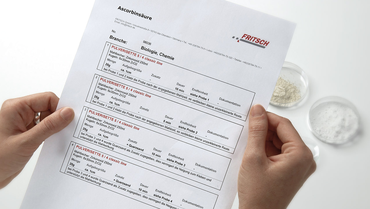Back to overview
Comminution of silicone rubber
Definition of the task
The task was to comminute the silicone rubber sample in the photo. In fact down to a particle size < 1 mm with the option - depending on the use of the comminuted material - even down to 0.1 mm. The material is very elastic. Therefore the first assumption was that a comminution is only possible with cutting mills and cooling with dry ice is mandatory.
Comminution with Cutting Mills
For the first step of the comminution of larger amounts we recommend the Universal Cutting Mill PULVERISETTE 19 large.
For analytical amounts a manual pre-comminution is possible. The in the example prepared sample was now additionally comminuted with the Universal Cutting Mill PULVERISETTE 19.
Using Dry Ice
Due to positive experiences with other elastomers, part of the sample was mixed with dry ice and comminuted with the use of the 4 mm sieve. This was possible without any problems. It is to be noted, that the silicone rubber, despite being cooled, remained elastic. The comminution in the second attempt was also without any difficulty.
Test with the Universal Cutting Mill
For the additional preparation, the sample comminuted down to 4 mm, was mixed with dry ice and put through the 1 mm sieve with the PULVERISETTE 19. The material could be comminuted very well. Therefore the first requirement was met: 100 % of the sample was comminuted down to < 1 mm. In order to generate finer materials, again dry ice was mixed in and it was attempted to comminute the material with the cutting mill with a 0.5 mm sieve. This attempt failed: the possible obtainable final fineness with a cutting mill is limited to a sieve throughput smaller than 1 mm.
Comminution with the Variable Speed Rotor Mill
Since the desired final fineness could not be obtained in this manner, in the next attempt, the Variable Speed Rotor Mill PULVERISETTE 14 classic line with a 0.5 mm sieve was utilized. Used was the previously comminuted down to 4 mm material (comminuted without cooling with the Universal Cutting Mill PULVERISETTE 19). For this attempt the material was not cooled with dry ice. Without any difficulty, with this mill, silicone rubber could be comminuted with the sieve throughput of 0.5 mm. In the last attempt, the previously with the cutting mill down to < 1 mm comminuted material, was prepared with the Variable Speed Rotor Mill PULVERISETTE 14 classic line by using a 0.2 mm sieve. The material could be put through a 0.2 mm sieve without cooling.
Empirical values for the comminution with the Variable Speed Rotor Mill PULVERISETTE 14 classic line illustrate, that the prepared material is 50 % smaller than half of the mesh width. Therefore, the initially demanded prerequisite to comminute silicone rubber down to 0.1 mm is met.
After the conclusions of all tests, the material characteristics were looked up: silicone rubber remains with special types by all means up to -90 °C elastic. It became clear, that the method of comminution via cooling like attempted in the beginning, is not advantageous.
In summary, it is to be asserted:
- In order to generate analytical amounts clearly smaller than 1 mm, three steps are necessary
- The manual pre-comminution down to approximately 2 cm
- The first step of the fine comminution with the Universal Cutting Mill PULVERISETTE 19 with a 4 mm sieve
- The second step of the comminution down to the desired end fineness with the Variable Speed Rotor Mill PULVERISETTE 14 classic line with a 0.5 mm sieve
For larger amounts a comminution in two steps would also be possible:
- at first with a Universal Cutting Mill PULVERISETTE 19 large with a 4 mm sieve
- then with the Variable Speed Rotor Mill PULVERISETTE 14 classic line with a 0.5 mm sieve
- it is recommended to equip the Variable-Speed Rotor Mill PULVERISETTE 14 classic line with a conversion kit for grinding larger quantities and combine it with the Vibratory Feeder LABORETTE 24
-
Download the FRITSCH-report as PDF file
-
Detailed grinding reports
Back to overview













